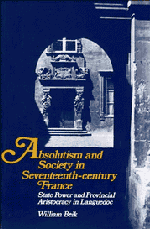 Absolutism and Society in Seventeenth-Century France
Absolutism and Society in Seventeenth-Century France Book contents
- Frontmatter
- Contents
- List of tables
- List of figures
- Preface
- List of abbreviations
- Map: Languedoc in the seventeenth century
- PART ONE INTRODUCTION
- PART TWO THE DISTRIBUTION OF AUTHORITY
- PART THREE THE PROVINCE ON ITS OWN
- PART FOUR THE PROVINCE AND THE CROWN
- 10 Channels of personal influence
- 11 Tax flows and society
- 12 Collaborating with the king: positive results and fulfilled ambitions
- 13 Basking in the sun: the triumph of authority and hierarchy
- Conclusion
- Appendix: Breakdown of taxes from the diocese of Toulouse, 1677
- Select bibliography
- Index
11 - Tax flows and society
Published online by Cambridge University Press: 05 July 2011
- Frontmatter
- Contents
- List of tables
- List of figures
- Preface
- List of abbreviations
- Map: Languedoc in the seventeenth century
- PART ONE INTRODUCTION
- PART TWO THE DISTRIBUTION OF AUTHORITY
- PART THREE THE PROVINCE ON ITS OWN
- PART FOUR THE PROVINCE AND THE CROWN
- 10 Channels of personal influence
- 11 Tax flows and society
- 12 Collaborating with the king: positive results and fulfilled ambitions
- 13 Basking in the sun: the triumph of authority and hierarchy
- Conclusion
- Appendix: Breakdown of taxes from the diocese of Toulouse, 1677
- Select bibliography
- Index
Summary
The exchange of taxes was another transaction which established relationships between king and rulers, rulers and population. Too often taxation has been conceptualized as extraction, the chief question being how much the king could draw from the province and how much the province could hold back. What was really at stake, however, was distribution, for Languedocian taxes represented one of the largest, most regular flows of liquid wealth in the province – one which could be tapped by those with influence or privilege. Taille collection siphoned off a substantial amount of the surplus produced by peasants and artisans and channelled it upwards towards the Estates and the king. Along the way it passed through the hands of a multitude of financier–collectors who profited from their possession of it in a variety of ways. When it reached its destination it was redistributed, often within the province. This system of collection and distribution affected the political stance taken by the various provincial institutions and the changing relations of certain individuals and groups to the crown. It was one of the major sources of new wealth for those on the rise, and it explains some of the anger against partisans which characterized the first half of the century. Most important, it provides another dimension in explaining the change in royal–provincial relations which took place after 1660.
- Type
- Chapter
- Information
- Absolutism and Society in Seventeenth-Century FranceState Power and Provincial Aristocracy in Languedoc, pp. 245 - 278Publisher: Cambridge University PressPrint publication year: 1985


